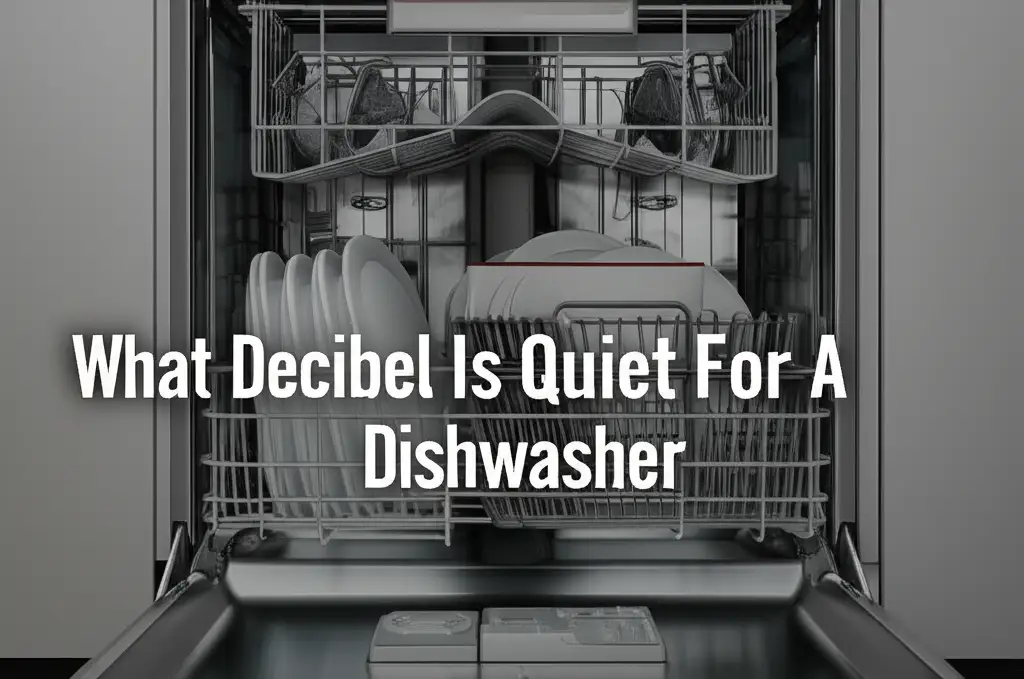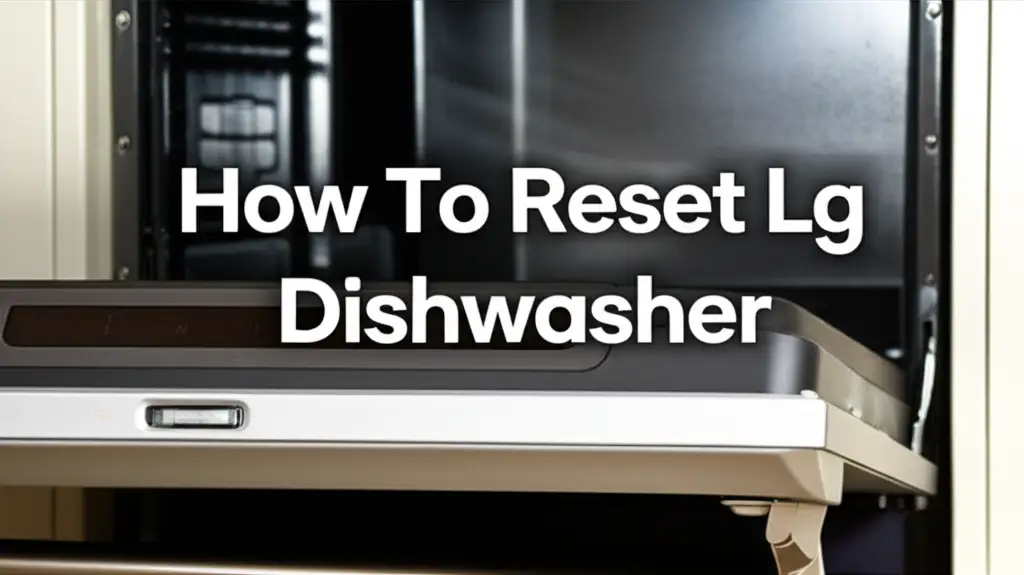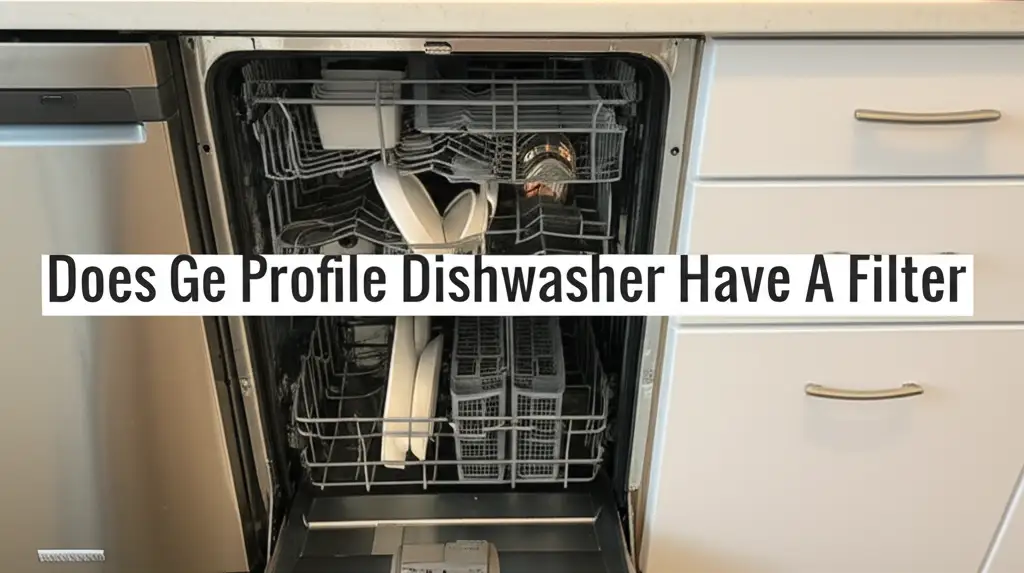· Elira Thomsen · Home Appliances · 18 min read
What Is The Decibel Rating On Dishwashers

Understanding Dishwasher Decibel Ratings: A Quieter Home Starts Here
Imagine this: You are trying to enjoy a quiet evening at home. Suddenly, your dishwasher starts its cycle, filling your kitchen with a loud hum. Does this sound familiar? Many homeowners face this common annoyance. The noise level of a dishwasher significantly impacts your home’s comfort. This is why understanding the decibel rating on dishwashers matters.
The decibel rating indicates how loud an appliance is. A lower decibel number means a quieter machine. Choosing a quiet dishwasher can transform your kitchen into a peaceful space. It allows for conversations, TV watching, or simply enjoying silence. This article will explain what decibel ratings mean. We will explore how they affect your home environment. You will also learn how to choose the quietest dishwasher for your needs. Join me on this journey to a more serene kitchen.
Takeaway
- Decibel (dB) ratings measure dishwasher noise levels. Lower numbers mean a quieter operation.
- Most dishwashers range from 38 dB to 60 dB. Very quiet models are typically 44 dB or below.
- Noise affects home comfort. A loud dishwasher can disrupt daily life and open-concept living.
- Look for dB ratings on energy guides or product specifications. Manufacturers provide this key information.
- Consider insulation, motor type, and tub material. These factors greatly influence a dishwasher’s quietness.
- Proper installation and regular maintenance reduce noise. Ensure the appliance is level and clean.
What is the decibel rating on dishwashers?
The decibel rating on dishwashers measures the sound level they produce during operation. This measurement, expressed in decibels (dB), helps consumers compare models for quietness. A lower decibel number indicates a quieter appliance, enhancing home comfort. Most dishwashers range from 38 dB (very quiet) to 60 dB (noticeable noise).
What Do Dishwasher Decibels Mean? Decoding the Sound Scale
The term “decibel” might sound technical. However, it is a simple way to measure sound intensity. A decibel (dB) is a unit used to express the ratio of a value to a reference value. In sound, it measures sound pressure level. For dishwashers, this number tells you how loud the machine will be when it runs.
The decibel scale is logarithmic. This means a small change in numbers represents a large change in perceived loudness. For example, a 10 dB increase means the sound is twice as loud. A dishwasher rated at 50 dB is significantly louder than one rated at 40 dB. Understanding this scale helps you make informed choices. You can avoid surprises after installation.
Understanding Common Decibel Levels
Let us put dishwasher decibel ratings into perspective. Normal conversation occurs around 60 dB. A quiet library might be around 40 dB. A whisper is about 30 dB.
- 60 dB and above: This level is quite loud for a dishwasher. You will easily hear it running. It might interrupt conversations or TV watching.
- 50-59 dB: This range is noticeable. It is comparable to light rain or a quiet office. It might still be disruptive in an open-concept home.
- 45-49 dB: This is considered a good, quiet range. You will barely notice the dishwasher. It is similar to the hum of a refrigerator.
- 44 dB and below: This range is whisper-quiet. These are premium, silent dishwashers. You might not even know they are running. This is ideal for open living spaces. For more details on what constitutes a quiet dishwasher, you can read about what decibel is quiet for a dishwasher.
Choosing a dishwasher in the lower decibel range greatly improves your home environment. It allows for peace and quiet. This is especially true if your kitchen is near living areas.
Why Does a Dishwasher’s Decibel Rating Matter for Your Home?
The sound level of your dishwasher affects your daily life more than you might think. We spend a lot of time in our kitchens. It is often the heart of the home. A noisy appliance can disrupt this central hub. This is why the decibel rating on dishwashers is a critical specification.
Think about open-concept living spaces. Kitchens often flow into dining rooms or living rooms. A loud dishwasher in an open layout means noise spreads throughout your main living areas. This can make it hard to relax, talk, or watch TV. It turns a peaceful evening into a noisy one.
Impact on Comfort and Lifestyle
A quiet dishwasher contributes to a calm home environment. You can run it any time without disturbance. This includes late at night or during gatherings. Consider these specific impacts:
- Sleep quality: If your kitchen is near bedrooms, a loud dishwasher running at night can disturb sleep. A quiet model helps maintain a peaceful sleep environment.
- Socializing: Hosting guests becomes easier with a quiet dishwasher. You can run a load during dinner without shouting over the noise.
- Work from home: Many people work from home. A noisy appliance can be a major distraction. A quiet dishwasher creates a better work environment.
- Daily activities: Whether reading, listening to music, or simply relaxing, a loud dishwasher is disruptive. A quiet one allows for uninterrupted enjoyment of your home.
Investing in a quieter model improves your quality of life at home. It reduces stress from constant background noise. It makes your home a more comfortable place to be. Prioritizing a low decibel rating pays off in everyday peace.
Deciphering Dishwasher dB Ranges: From Loud to Whisper Quiet
Dishwashers come with a range of decibel ratings. This range typically spans from the low 40s to the high 60s. Knowing what these numbers mean helps you set expectations. It also guides your purchase decision. A dishwasher’s noise level is a key factor for many buyers.
A dishwasher rated at 60 dB is considered quite loud. It is similar to the noise level of a normal conversation or a window air conditioner. You will definitely hear it. These models are usually less expensive. They might suit homes where noise is not a major concern. This could be in a closed-off kitchen or a basement apartment.
The Sweet Spot for Quietness
Most modern homeowners aim for something quieter. A dishwasher between 45 dB and 49 dB is a good balance of cost and performance. This noise level is comparable to a quiet refrigerator hum. You will notice it, but it will not be disruptive. This range is popular for family homes.
For the ultimate quiet experience, look for dishwashers rated 44 dB and below. These are premium, virtually silent machines. They use advanced insulation and motor technology. You might need to check the indicator light to know if they are running. These models are ideal for open-concept homes. They are also perfect for anyone who values extreme quiet. As discussed earlier, understanding what decibel is quiet for a dishwasher is crucial for this decision.
Choosing a dishwasher within your preferred dB range is about balancing budget and comfort. Consider your home layout and lifestyle. A slightly higher price for a quieter model often brings significant long-term peace.
Factors Influencing Dishwasher Noise Levels
Many elements contribute to how loud a dishwasher operates. It is not just about a single component. Manufacturers engineer dishwashers with noise reduction in mind. They use specific materials and design features. Understanding these factors helps you appreciate the price difference between models. It also helps you choose wisely.
One major factor is the motor type. Older or cheaper dishwashers might use standard motors. These motors can be noisier. High-end dishwashers often feature brushless motors or advanced pump designs. These motors run more smoothly and quietly. They also tend to last longer.
Key Components Affecting Noise
Several key components work together to manage sound.
- Insulation: The amount and type of insulation around the dishwasher tub make a big difference. High-density insulation, like asphalt sheets or bitumen, absorbs sound waves. It prevents noise from escaping the appliance. More insulation generally means a quieter dishwasher.
- Tub Material: Stainless steel tubs are common in quieter dishwashers. Stainless steel absorbs sound better than plastic tubs. Plastic tubs can amplify vibrations, leading to more noise. Stainless steel also resists stains and odors better.
- Wash System Design: The way water sprays and circulates impacts noise. Advanced wash systems use efficient spray arms. They have quieter water pumps. Some systems even include noise-dampening spray patterns. This reduces the sound of water hitting dishes.
- Filtration System: Efficient filtration reduces food particles recirculating. This prevents clogging that can make the pump work harder and louder. Self-cleaning filters are common in quieter models.
- Installation: Proper installation is crucial. An uneven dishwasher can vibrate against cabinets or the floor. This creates extra noise. Ensure the dishwasher is level and securely fastened. You can learn more about finding a quiet dishwasher by reviewing what decibel is quiet for a dishwasher.
These design choices directly influence the decibel rating. They also impact the overall cost of the appliance. A higher quality, quieter dishwasher often means better materials and engineering.
How to Find the Decibel Rating on a Dishwasher
Finding the decibel rating for a dishwasher is straightforward. Manufacturers know that quietness is a top selling point. They make this information easy to locate. You do not need to be an expert to find it. Knowing where to look will save you time and effort.
The most common place to find the decibel rating is on the Energy Guide label. This yellow label is affixed to most new appliances. It provides information on energy consumption. It also prominently displays the decibel rating. This label allows for quick comparison between models side-by-side in a store. It helps you see energy use and noise levels at a glance.
Other Sources for dB Information
If the Energy Guide label is missing or unclear, several other sources provide the decibel rating:
- Product Specifications: Every dishwasher model has a detailed specification sheet. These are available online on the manufacturer’s website. Retailer websites also list them. Search for the model number and “specifications” or “tech specs.” The decibel rating will be listed under sound or noise levels.
- Online Retailer Listings: Major online appliance retailers like Amazon, Best Buy, or Home Depot list decibel ratings. They often include it in the product description or a dedicated “specifications” tab. This is convenient for online shopping.
- In-Store Displays: If shopping in person, look for spec sheets near the appliance. Sales associates can also provide this information. Do not hesitate to ask them for details on noise levels.
- Manufacturer Websites: The official website for brands like Bosch, Miele, Whirlpool, or LG will have comprehensive details. They often have comparison tools. This lets you sort models by decibel rating.
Always verify the decibel rating before making a purchase. This ensures you get the quietness you expect. A quick check of these sources will confirm the noise level. This simple step prevents buyer’s remorse regarding noise.
Choosing a Quiet Dishwasher: Key Considerations Beyond Decibels
While the decibel rating is a primary factor, it is not the only thing to consider. A quiet dishwasher also needs to perform well. It should clean dishes effectively and last a long time. Thinking about these other features helps you make a holistic decision. You want a quiet appliance that meets all your needs.
First, consider the wash performance. A quiet dishwasher is useless if it leaves dishes dirty. Look for models with excellent cleaning reviews. Features like multiple spray arms, specialized wash cycles, and good filtration systems contribute to cleaner dishes. Some models have sensors that detect soil levels. These sensors adjust wash intensity as needed.
Features That Enhance Quietness and Performance
Beyond the dB number, these features contribute to a great, quiet dishwasher:
- Third Rack: Many quiet dishwashers include a third rack. This slim rack at the top is perfect for silverware and small items. It helps organize dishes better. Proper loading can reduce clanging noises during a cycle.
- Adjustable Racks: Flexible racks allow you to fit various dish sizes. This helps secure items. Secure dishes move less during the wash, reducing noise. It also maximizes loading capacity.
- Leak Protection Systems: While not directly noise-related, a good leak protection system offers peace of mind. It prevents water damage. This means you do not have to worry about running the dishwasher overnight.
- Delayed Start Option: A delayed start feature allows you to run the dishwasher during off-peak hours. This means it can run when you are asleep or away. This maximizes the benefit of a quiet machine. You run it when noise matters least.
- Energy Efficiency: Quiet dishwashers often use less energy and water. Look for Energy Star certified models. These reduce utility bills and environmental impact. They are designed for efficient operation, which often translates to quieter performance.
- Brand Reputation: Some brands are known for producing quieter appliances. Brands like Bosch, Miele, and KitchenAid often lead in quiet dishwasher technology. Researching customer reviews for specific models from these brands can provide valuable insight. For additional insights on quiet dishwashers, considering what decibel is quiet for a dishwasher is always beneficial.
Choosing a quiet dishwasher involves weighing several factors. Focus on performance, features, and brand reputation in addition to the decibel rating. This ensures you select the best appliance for your home.
Beyond Decibels: Other Tips for a Quieter Kitchen
Even the quietest dishwasher can become noisy if not properly maintained or installed. The decibel rating is a baseline. However, your actions can significantly impact the actual sound level in your kitchen. Taking a few extra steps ensures you maximize your dishwasher’s quiet operation. These tips also contribute to overall kitchen harmony.
First, proper installation is paramount. An unlevel dishwasher vibrates. This creates unwanted noise. Ensure the appliance is perfectly level on the floor. Tighten all securing screws. Some models come with leveling feet. Use them to stabilize the machine. Proper sealing around the edges also helps contain sound.
Maintenance and Usage for Reduced Noise
Regular maintenance and smart usage habits also play a role:
- Load Dishes Correctly: Overloading or improperly loading dishes can cause them to rattle. Ensure plates, glasses, and silverware are secure. Avoid placing items where they can block spray arms. This also improves cleaning performance.
- Pre-Rinse If Necessary: While many modern dishwashers do not require pre-rinsing, excessive food debris can sometimes make the pump work harder. This creates more noise. If you notice loud grinding sounds, a quick scrape of plates might help.
- Clean the Filter Regularly: Dishwashers have filters to catch food particles. A clogged filter makes the pump strain. This increases noise. Consult your owner’s manual for filter cleaning instructions. This simple task takes minutes.
- Check for Loose Parts: Over time, screws or components can become loose. Periodically inspect the spray arms and racks. Tighten anything that feels wobbly. This prevents rattling during cycles.
- Sound-Dampening Mats: For existing noisy dishwashers, you can install sound-dampening mats. These are placed under the appliance. They absorb vibrations and reduce noise transmission to the floor.
- Consider Cabinetry: Good quality, sturdy cabinetry around the dishwasher can help absorb sound. Gaps or flimsy cabinets might allow more noise to escape. Ensuring a snug fit is beneficial.
These practical steps complement a low decibel rating. They help maintain your dishwasher’s quiet operation. Implementing these tips leads to a more serene kitchen experience. A quiet kitchen contributes to a more relaxing home.
Understanding the Decibel Rating on Dishwashers: Advanced Insights
Let us dive deeper into the science behind dishwasher noise. The decibel rating is a single number. However, the type of noise matters too. A dishwasher might have a low decibel rating but produce an annoying high-pitched whine. Another might have a slightly higher rating but produce a low, soothing hum. Our perception of noise is subjective.
Manufacturers use advanced techniques to minimize unpleasant sounds. They focus on reducing specific frequencies. For example, the sound of water spraying might be a low hum. The sound of the pump working could be a higher pitch. Good engineering smooths out these different sounds. This makes the overall operation more pleasant. It creates a better acoustic experience for the user.
Innovative Noise Reduction Technologies
Modern dishwashers employ various technologies to achieve low decibel ratings:
- Brushless DC Motors (BLDC): These motors are more efficient and quieter than traditional AC motors. They have fewer moving parts. This reduces friction and vibration, leading to less noise.
- Multiple Layers of Insulation: Beyond basic insulation, premium models use several layers of different materials. This multi-layer approach traps and absorbs a wider range of sound frequencies.
- Suspension Systems: The entire washing mechanism might be suspended within the appliance. This reduces vibrations transferred to the outer casing and surrounding cabinetry. It essentially “floats” the noisy parts.
- Detergent and Water Sensors: Smart sensors optimize water use and detergent dispensing. This prevents unnecessary splashing or motor strain. An optimized cycle is a quieter cycle.
- Quiet Dry Systems: Some dishwashers use condensation drying instead of heating elements. This eliminates the noise of a fan or a loud heating cycle. It adds to overall quiet operation.
- Rigid Base and Frame: A strong, sturdy base and frame absorb vibrations. This prevents the entire appliance from resonating. A solid foundation minimizes noise transmission.
These technological advancements are what separate a truly quiet dishwasher from a merely “acceptable” one. They contribute to the premium price point. However, they deliver a significantly better user experience. They make a dishwasher virtually imperceptible. This helps maintain the tranquility of your home.
The Future of Quiet Dishwashers: What to Expect
The trend towards quieter home appliances continues to grow. Consumers increasingly value peace and comfort in their living spaces. This drives innovation in noise reduction technology for dishwashers. We can expect even quieter models in the future. The average decibel rating for new dishwashers will likely decrease.
Manufacturers are always looking for new materials and designs. They aim to push the boundaries of silence. Imagine a dishwasher so quiet you truly cannot tell it is running. This is the goal. Developments in motor technology, insulation, and smart controls will lead the way.
Emerging Trends and Innovations
Several areas show promise for future noise reduction:
- Advanced Materials: New composite materials and acoustic foams could offer superior sound absorption. These might be lighter and more efficient.
- AI and Machine Learning: Artificial intelligence could optimize wash cycles in real-time. It might adjust pump speeds and water flow. This reduces noise based on load size and soil level.
- Vibration Cancellation: Similar to noise-canceling headphones, future dishwashers might incorporate active vibration cancellation. This technology would actively counteract vibrations. It would nullify sound waves.
- Modularity: Dishwashers could become more modular. This allows for easier upgrades to quieter components. It also makes maintenance simpler.
- Integrated Smart Home Systems: Future dishwashers will integrate even more seamlessly with smart home systems. You could receive alerts when a cycle finishes, eliminating the need to listen for sounds. You could also program operation based on household activity.
The quest for the perfectly quiet dishwasher is ongoing. As homes become more integrated and open, silence becomes a luxury. Manufacturers understand this demand. The decibel rating on dishwashers will remain a key selling point. We anticipate a future where dishwasher noise is a thing of the past. This will contribute to truly serene smart homes.
FAQ Section
Q1: What is a good decibel rating for a quiet dishwasher?
A good decibel rating for a quiet dishwasher is typically 44 dB or below. Dishwashers in the 45-49 dB range are also considered quiet and suitable for most homes. Anything above 50 dB will be noticeable and potentially disruptive in an open living space. Lower numbers mean a more peaceful kitchen environment.
Q2: How does a dishwasher’s decibel rating affect my energy bill?
The decibel rating itself does not directly affect your energy bill. However, quieter dishwashers often incorporate advanced, energy-efficient components like brushless motors and better insulation. These features tend to reduce energy consumption. Look for Energy Star certified models, which are both quiet and energy-efficient.
Q3: Can I make my existing noisy dishwasher quieter?
Yes, you can take steps to reduce noise from an existing dishwasher. Ensure it is level and securely installed. Check and clean the filter regularly to prevent pump strain. Load dishes correctly to avoid rattling. Adding sound-dampening mats under the appliance can also help absorb vibrations and reduce noise transmission.
Q4: Why are some dishwashers much more expensive for a lower dB rating?
Higher prices for lower dB ratings reflect advanced engineering and materials. Manufacturers invest in features like multiple layers of high-density insulation, stainless steel tubs, brushless motors, and advanced wash systems. These components reduce noise effectively. The added cost also covers research and development for superior quiet technology.
Q5: Is a decibel rating of 38 dB truly silent?
A decibel rating of 38 dB is extremely quiet, often described as whisper-quiet or virtually silent. While not absolute silence (which is 0 dB), it is below the typical ambient noise level in most homes. You would likely only notice it if listening closely, and it would not interfere with conversations or other activities.
Conclusion
Understanding the decibel rating on dishwashers is essential for creating a comfortable home environment. It dictates how much noise your appliance will add to your kitchen. A lower decibel number means a quieter machine. This translates directly to more peace and less disruption in your daily life. We explored what these ratings mean and why they matter for your comfort.
Choosing a quiet dishwasher involves looking beyond just the dB number. Consider the build materials, motor type, and insulation used. Remember, proper installation and regular maintenance also play a huge role in keeping your dishwasher quiet. By prioritizing a low decibel rating and smart features, you can ensure your kitchen remains a tranquil space. Invest in a quieter appliance today, and enjoy the blissful silence tomorrow. Your home, and your ears, will thank you.





